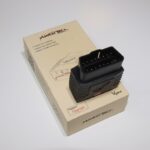When your Hyundai Accent’s check engine light illuminates, it signals a potential issue within your vehicle’s system. The On-Board Diagnostics II (OBD2) system generates specific diagnostic trouble codes (DTCs), providing valuable insights into the problem. Understanding these Hyundai Accent Obd2 Codes is crucial for effective troubleshooting and repair. This guide provides a comprehensive list of common Hyundai Accent OBD2 codes and their potential causes.
Common Hyundai Accent OBD2 Codes and Their Meanings
The following table outlines common OBD2 codes for Hyundai Accent vehicles, along with their associated problems:
| Code | Potential Problems |
|---|---|
| P0010 | Powertrain Control Module (PCM) failure, Variable valve timing actuator issues, Wiring problems |
| P0011 | Camshaft variable timing solenoid issues, Low engine oil, Incorrect engine timing, Incorrect engine oil viscosity, Variable valve timing actuator issues, Worn timing chain |
| P0012 | Similar to P0011: Camshaft variable timing solenoid, engine oil, timing, oil viscosity, actuator, timing chain |
| P0013 | Powertrain Control Module (PCM) failure, Variable valve timing actuator issues, Wiring problems |
| P0014 | Similar to P0011: Camshaft variable timing solenoid, engine oil, timing, oil viscosity, actuator, timing chain |
| P0101 | Vacuum leaks, Issues with intake air boot or PCV hose, Defective intake manifold gaskets, Mass Airflow Sensor (MAF) problems, MAF circuit/wiring issues, Barometric Pressure Sensor issues, Dirty MAF sensor, PCM software update needed |
| P0102 | MAF sensor unplugged or damaged wiring, Loose or corroded MAF sensor circuit terminals, Faulty MAF sensor |
| P0113 | Defective Intake Air Temperature Sensor, Dirty air filter, Defective Mass Air Flow Sensor, Faulty Intake Air Temperature Sensor wiring |
| P0128 | Defective thermostat, coolant temperature sensor, intake air temperature sensor, cooling system issues, low coolant, dirty coolant, faulty cooling fan |
| P0135 | Defective Oxygen Sensor/Air Fuel Ratio Sensor, heater circuit issues, exhaust leaks, intake leaks, low fuel pressure, defective coolant temperature sensor, wiring/circuit problems, PCM software update, defective PCM |
| P0171 | PCM software update needed, Vacuum leaks, MAF sensor issues, clogged fuel filter, weak fuel pump, dirty fuel injectors |
| P0174 | Similar to P0171: PCM software, vacuum leaks, MAF sensor, fuel filter/pump, fuel injectors |
| P0200 | Defective fuel injector, wiring/connection issues, plugged injector, dirt in injector |
| P0201 | Similar to P0200: Defective fuel injector, wiring, plugged injector, dirt |
| P0202 | Fuel injector malfunction, PCM fuel injector driver circuit malfunction, wiring/connection issues, fuel injector power circuit issues |
| P0203 | Fuel injector failure, PCM failure, Wiring issue |
| P0205 | Fuel injector failure, PCM failure, Wiring issue |
| P0300 | Worn spark plugs, ignition wires, coils, distributor cap/rotor, incorrect ignition timing, vacuum leaks, low fuel pressure, EGR system malfunction, faulty MAF/Crankshaft/Camshaft/Throttle Position Sensors, mechanical engine problems |
| P0301 | Similar to P0300: Ignition system components, timing, vacuum leaks, fuel pressure, EGR, sensors, mechanical issues (Cylinder 1 misfire) |
| P0302 | Similar to P0300: Ignition system components, timing, vacuum leaks, fuel pressure, EGR, sensors, mechanical issues (Cylinder 2 misfire) |
| P0303 | Similar to P0300: Ignition system components, timing, vacuum leaks, fuel pressure, EGR, sensors, mechanical issues (Cylinder 3 misfire) |
| P0304 | Similar to P0300: Ignition system components, timing, vacuum leaks, fuel pressure, EGR, sensors, mechanical issues (Cylinder 4 misfire) |
Hyundai-Specific Codes and Further Diagnosis
While the codes listed above are generic OBD2 codes, your Hyundai Accent may also display manufacturer-specific codes starting with “P1.” These codes require specialized diagnostic equipment and expertise for accurate interpretation.
Consult a qualified Hyundai technician or use a professional-grade OBD2 scanner for comprehensive diagnostics and repair. A professional can leverage their knowledge and specialized tools to address the underlying cause of your vehicle’s issue effectively.

